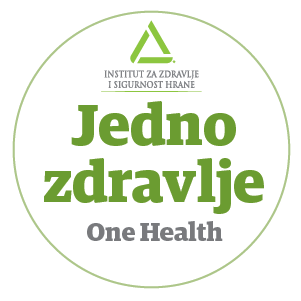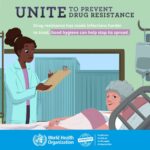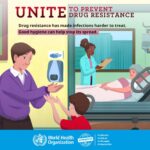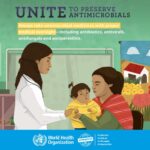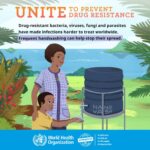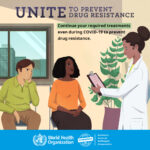WORLD ANTIMICROBIAL AWARENESS WEEK (WAAW) 2020
18.-24. November 2020.
“Antimicrobials: handle with care”
“ United in the One Health approach to protect antimicrobials”
World Antimicrobial Awareness Week (WAAW) aims to increase awareness of global antimicrobial resistance (AMR) and to encourage best practices among the general public, health workers and policy makers to avoid the further emergence and spread of drug-resistant infections.
Since 2015, WAAW has been focusing on awareness-raising and education towards the responsible and prudent use of the antimicrobials. Previously World Antibiotic Awareness Week, the name was changed this year to World Antimicrobial Awareness Week to reflect the breadth of the initiative. Antimicrobials include antibiotic, antiviral, antifungal and antiprotozoal agents, which are critical tools for treating diseases in humans, animals and plants.
WAAW is particularly important this year as the COVID-19 crisis is increasing the misuse and overuse of antimicrobials, including antibiotics. Unless something is done, this could worsen the growing, long-term problems of antimicrobial resistance (AMR).
Antimicrobial resistance (AMR) occurs when bacteria, viruses, fungi, and parasites resist the effects of medications, making common infections harder to treat and increasing the risk of disease spread, severe illness and death. Multiple factors – including overuse of medicines in humans, livestock, and agriculture, as well as poor access to clean water, sanitation and hygiene – have accelerated the threat of antimicrobial resistance worldwide.
Institute for Health and Food Safety Zenica recognizes the need for access to antimicrobials, as they are essential to ensure human and animal health, food supply, and food safety. However, countries need to step up implementation of their national AMR strategies and policies across sectors, as well as their commitment to tackling the emergence of AMR.
Therefore, INZ advises people not to use antimicrobials (antibiotics, amtiparasitics, etc.) without a doctor’s supervision, or that they should be used only when prescribed by a doctor in the exact dose, interval and time of application.
On the other hand, patients can get infections when receiving healthcare, commonly caused by antibiotic-resistant pathogen, which may lead to sepsis or death. People can also get antibiotic-resistant infections in their community, for example, gonorrhea, tuberculosis (TB), or foodborne infections. Take the following actions to help protect your patients and people in the community from antibiotic-resistant infections.
- Help Prevent Infections and their Spread
- Improve Antibiotic Prescribing
- Be Alert and Take Action
Antibiotics save lives, but any time they are used it can cause side effects and lead to antibiotic resistance.
Also, INZ advises farmers (owners and / or keepers of animals) not to use antimicrobials alone, but that they should be used only by an authorized veterinarian. Unfortunately, such behavior in the past has led to the emergence of antimicrobial drug resistance, but now in practice it also leads to financial losses. Eg. due to unprofessional and inappropriate use of antibiotics in dairy cows, the withdrawal period of certain drugs is prolonged (period of drug excretion from the body), so the purchase of this raw milk is prohibited, because such milk is not allowed for human and animal consumption, which causes farmers financial losses.
Veterinarians are leaders and stewards in preserving the effectiveness of antibiotics for animals and people. Working with animal owners and producers, veterinarians can slow antibiotic resistance by implementing disease prevention strategies and improving the use of antibiotics while also guaranteeing high-quality medical care for animal patients. Take the following actions to help protect your patients and people in the community from antibiotic-resistant infections:
- Prevent Disease
- Clean Your Hands & Equipment
- Maintain Accurate Records of Treatment & Outcomes
- Select & Use Antibiotics Appropriately
- Stay Current (Stay up-to-date on disease prevention tools; and professional standards for antibiotic use)
- Prevent Environmental Contamination
- Commit to Antibiotic Stewardship.
AMR is a global crisis and there is no time to wait. Everyone has a role to play in preserving the effectiveness of antimicrobials. The Tripartite calls on their Member States to strengthen measures to combat AMR, widely publicize the global challenge and encourage people to change their behaviour regarding the use of antimicrobials. Human and animal health agencies, the environment and food sectors, as well as civil society must unite efforts to preserve antimicrobial efficacy through a multisectoral One Health approach.
The AMR crisis applies to everyone. So, let us act for the sake of all humanity.
ONE HEALTH – ONE WORLD – ONE FUTURE
Rusmir Goletic, DVM
